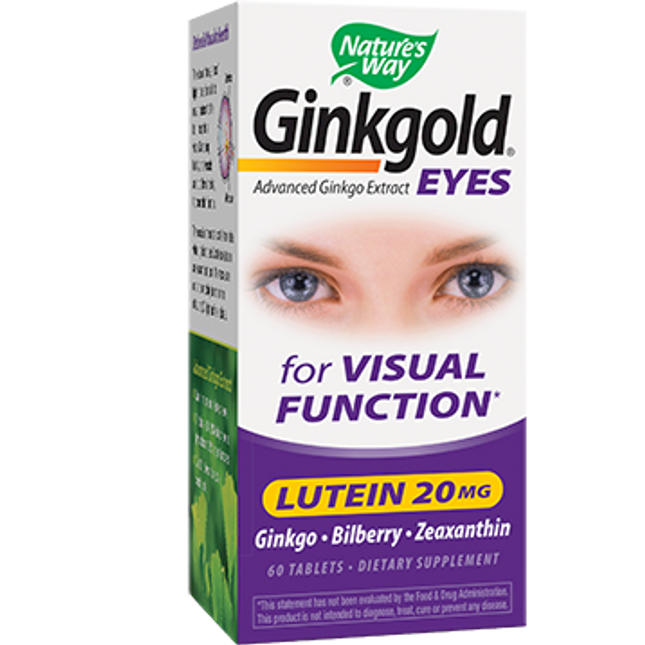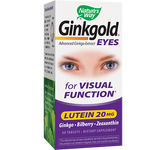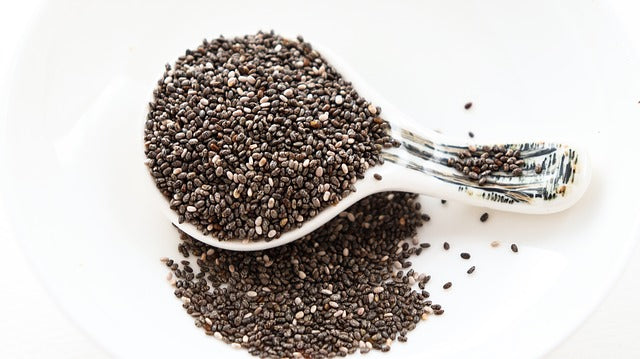Vision Support


Description Ginkgold is the original and patented ginkgo extract (U.S. patent #5399348). For years, it has been a best selling natural health care product in Europe and the United States. And it's the only ginkgo extract used and recommended by doctors and other healthcare professionals in over 70 countries, outselling all other ginkgo products combined worldwide. Usage For Visual Function Ginkgold improves mental sharpness, concentration, memory and cognitive activity. It also supports healthy circulation to the brain as well as the extremities. And, it maintains healthy blood vessel tone and reduces blood viscosity.* Amount Per Serving Bilberry Fruit, dried extract 25% anthocyanins 120 mg  Ginkgold, patented ginkgo biloba dried extract 60 mg  Lutein Carotenoid (FloraGLO Marigold extract) 20 mg  Zeazanthin Carotenoid (FloraGLO Marigold extract)    Recommended Daily Dosage Take 2 tablets daily. May be used in conjunction with up to 180 mg of Ginkgold Ginkgo biloba extractÂÂÂ
$38.99
Vision Support Products
Vision support supplements are a great way to make certain you are getting all the nutrients you need to support and maintain your eyes. Proper eyecare consists of getting excellent nutrition through both vision supplements and good diet. Additionally, avoiding eyestrain, using proper eye protection and getting adequate rest all combine to create an excellent program of eye support. The vitamins and minerals necessary for proper eyecare are many and varied. That's why it's a good idea to take a vision multivitamin that provides plenty of beta-carotene and vitamin A, a good assortment of B vitamins, vitamins C, D and E. Additionally, a good vision multivitamin should provide carotenoids, such as lutein and macular pigments, such as zeaxanthin to help guard against macular degeneration and cataracts. Also, look for bioflavonoid to help support good absorption of vitamin C, phytochemical antioxidants to fight oxidative stress and Omega-3 fatty acids to help prevent dry eye and encourage general glowing health.
While vision supplements are very important, it is equally important to remember to eat a varied and balanced diet for optimum eye support and overall health benefits. When eating for good eyecare, you should be sure to eat lots of fresh fruits and veggies and whole grains. In fact, half your diet should be fresh fruit and vegetables and a quarter of it should be whole grains. The remaining quarter of your diet can be made up of lean protein sources, low fat dairy products and healthful oils such as olive, grapeseed, sunflower and other non-hydrogenated, natural types of oil. Be sure to drink plenty of fresh, pure water and avoid processed foods and foods that contain a great deal of sugar, salt and artificial ingredients. By following this sort of healthful, whole foods diet, you will enjoy excellent overall health and well-being, and your body will be able to make the best use of the vision support supplements you choose.
Blog posts
-

in Wellness Top 6 Essential Nutrients to Support Your Thyroid Health
Your thyroid gland, a small, butterfly-shaped wonder nestled in your neck, plays a pivotal role in your overall health and well-being. This unsung hero is...
-

in Wellness Effects Of Sleep Deprivation
A good night's sleep is vital to your health and well-being, so make it a priority of your daily routine. Follow these simple tips to...
-

in Wellness The Benefits Of Chia Seeds
Chia seeds offer a number of health benefits including a reduced risk of cardiovascular disease, improved glucose regulation, and weight loss.
-

in Wellness Women’s Heart Health Guide
Heart disease affects millions of women each year .Eating a healthy diet, getting enough exercise, and reducing your stress levels can reduce the risk of developing it.






